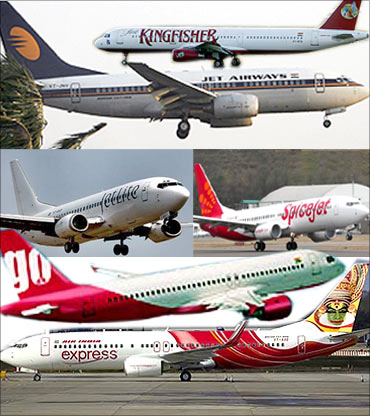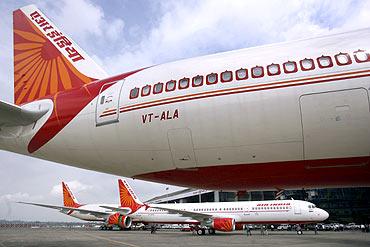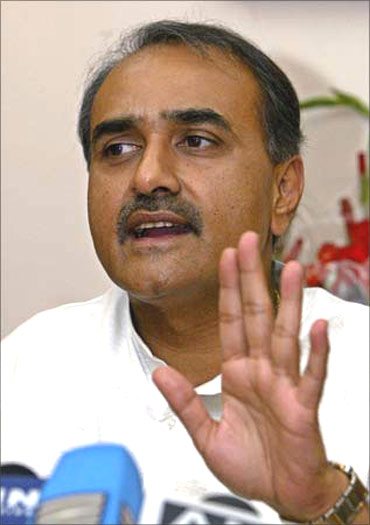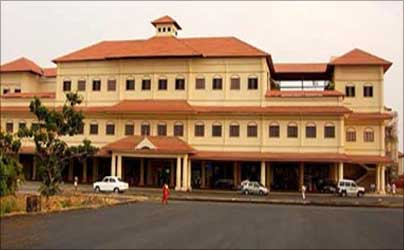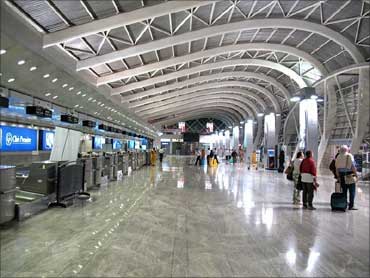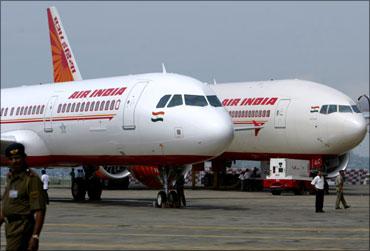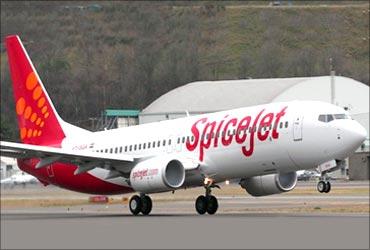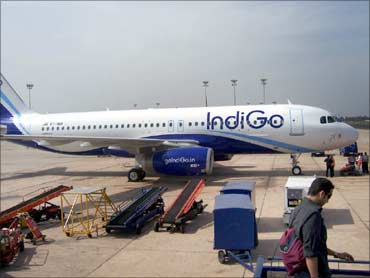Why Indian aviation grew by 400% in 6 years
Last updated on: December 20, 2010 11:58 IST
Civil Aviation Minister Praful Patel said the airline industry in India has grown by 400 per cent in a short span of about six-and-a-half years.
"Civil aviation in India since 2004 and now has grown by 400 per cent in the span of about six-and-a-half years," he said while presiding over a foundation stone laying ceremony for the Kannur International Airport at Mattannur on Friday.
He said in 10 years the Indian market will be the third largest aviation market after the United States and China.
Click NEXT to read on...
Why Indian aviation grew by 400% in 6 years
Last updated on: December 20, 2010 11:58 IST
Earlier this week, world aviation industry body International Air Transport Association had said that powered by emerging economies like China and India, carriers in the Asia-Pacific region will post highest profit ever of $7.7 billion in 2010, overtaking airlines in North America and Europe.
The foundation stone for Kannur International Airport was laid by Kerala Chief Minister V S Achuthanandan.
Complimenting the people, who had given up land for the project, he said the rehabilitation package for the people was one of the best and will be a 'model' in the country.
Click NEXT to read on
Why Indian aviation grew by 400% in 6 years
Last updated on: December 20, 2010 11:58 IST
The 26 per cent of equity will be with the government, 23 per cent with public sector undertakings, two per cent with other institutions promoted by the Government and 49 per cent with the private individual and institutions, he said.
Kerala has another airport, the Cochin International Airport Limited (CIAL), under the public-private participation. Patel said the airport will create a lot of economic activity in the entire region of north Kerala.
Referring to the issue of reduction in Air India flight services from Kerala to Gulf countries, he said, "In the recent past, there have been some issues of connectivity from Kerala especially by Air India."But we have to make sure that these issues do not continue to bother us in the future".
Click NEXT to read on
Why Indian aviation grew by 400% in 6 years
Last updated on: December 20, 2010 11:58 IST
Praful Patel also assured increased connectivity to Gulf countries in the next one months time.
India records the highest foreign remittance by any country anywhere in the world and a large part of that contribution comes from the people of Kerala.
Pointing that only 2 to 3 per cent of Indians fly by air in our country, he said: "with the economic development and with the GDP growing at 9 per cent and in Kerala especially with the kind of development taking place the number of people who travel by air will go up in the next ten years."
Click NEXT to read on
Why Indian aviation grew by 400% in 6 years
Last updated on: December 20, 2010 11:58 IST
The construction of the greenfield Kannur airport project was expected to be completed in two years time and acquisition of about 1,276 acres of land has already been done and another 700 acres more land acquisition work was in progress.
At present, Kerala has three international airports at Thiruvananthapuram, Nedumbassery and Karippur.
Expressing concern over exorbitant fares charged by airlines, Civil Aviation Minister Praful Patel said the aviation industry should keep in mind that the phenomenal growth in the sector has been due to the low fares offered earlier.
Click NEXT to read on
Why Indian aviation grew by 400% in 6 years
Last updated on: December 20, 2010 11:58 IST
"For five years, the aviation sector has grown on the back of low fares. We can't ignore this fact. The benefits of low fares have gone to the travelling public," he told
PTI days after warning the airlines that the government "cannot be a mute spectator" to the exorbitant last-minute fares they were charging.
He said the government wanted to be "open and transparent, but not interfering. It does not want to see either inconvenience to passengers or an unhealthy industry. It has to be a judicious mix of the two."
Click NEXT to read on
Why Indian aviation grew by 400% in 6 years
Last updated on: December 20, 2010 11:58 IST
Praful Patel's comments came days after the Ministry and the Directorate General of Civil Aviation (DGCA) asked domestic carriers to reduce spot fares (last-minute fares) and maintain transparency so that passengers were aware of the price they would pay if they travel on a route on a given date.
"Our concern is two-fold -- one that the fare structure is transparent and simple so that one knows what is the cost when one buys a ticket, and there are no hidden costs.
The other concern is that the absolutely exorbitant spot fares... are not acceptable to the government," he said answering questions.
He, however, made it clear that "we are not fixing the fares.
Click NEXT to read on
Why Indian aviation grew by 400% in 6 years
Last updated on: December 20, 2010 11:58 IST
We cannot decide airfares in a de-regulated sector. We don't wish to get into this area as airfares are driven by competition."
Patel said the spot fares were substantially hiked by airlines during and after Diwali as there was "a temporary mismatch between demand and supply."
Maintaining that the new Tariff Monitoring Unit (TMU) set up in the DGCA would not intervene in fare fixing, he said it would examine the fares and advise the government especially when the fares are very high.
Click NEXT to read on
Why Indian aviation grew by 400% in 6 years
Last updated on: December 20, 2010 11:58 IST
"We also do not encourage predatory fares that encourage unhealthy competition and jeopardise the prospects of the industry," the Minister said, making it clear that the TMU would only guide the DGCA and the government when fares are very high or low.
Though the airlines have lowered spot fares to an extent, their global body International Air Transport Association has opposed government intervention in airfares.
Click NEXT to read on
Why Indian aviation grew by 400% in 6 years
Last updated on: December 20, 2010 11:58 IST
"I don't think the government should have stepped in ... Market forces should determine air fares. In recent years, competition had driven down fares to a point where airlines were making no money. Such a situation cannot go on forever," IATA's Chief Economist Brian Pearce said in Geneva on Thursday.
If government intervenes too much, then it could lead to a situation like in Europe where increased taxation has pushed travel costs up by 3-4 per cent, resulting in fewer people flying, he cautioned.
Click NEXT to read on
© Copyright 2025 PTI. All rights reserved. Republication or redistribution of PTI content, including by framing or similar means, is expressly prohibited without the prior written consent.

